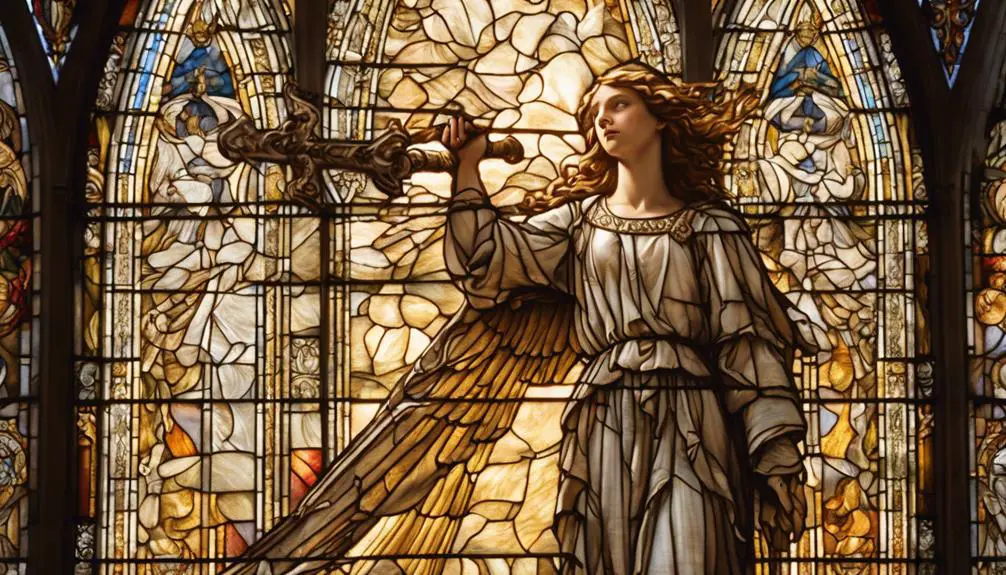Crack the code of the biblical flaming sword, an emblem of divine justice, redemption, and the consequences of sin that guards Eden's entrance.

Flaming Swords in the Bible
Surely, you've stumbled upon the striking image of the flaming sword in the Bible, specifically in the Genesis narrative. This fascinating feature is not just a mere weapon, but a symbol steeped in theological and philosophical implications.
What is the significance of this flaming sword guarding the entrance to Eden? How does such a fiery image play into the broader themes of sin, redemption, and divine justice?
Let's embark on this enlightening exploration together. There's more to this biblical blaze than meets the eye.
Key Takeaways
- The flaming sword in Genesis 3:24 symbolizes divine judgment, purification, and illuminating authority.
- In biblical prophecy and Christian art, flaming swords represent divine intervention, protection, and power.
- Theological interpretations of the flaming sword highlight paradoxes of God's love and wrath, and spiritual warfare.
- The flaming sword serves as a metaphor encouraging believers to equip themselves with the 'sword of the Spirit'.
Genesis: The Flaming Sword's Debut

Delving into the book of Genesis, you'll encounter the debut of the flaming sword, a fascinating symbol that's both mysterious and rich in theological implications. The sword's origin is found in Genesis 3:24 where it guards the way to the Tree of Life, following Adam and Eve's expulsion from Eden.
The Genesis impact on this symbol can't be overstated. It presents the flaming sword as a divine tool, wielded by a cherubim. This representation is unique to Genesis and sets the stage for the sword's later appearances in biblical narratives.
The text doesn't provide detailed specifications of the sword's physical attributes. Yet, it doesn't diminish the sword's importance. Instead, it accentuates the mystery surrounding it. The flaming sword in Genesis marks a critical point in humanity's relationship with divinity, symbolizing a barrier between humanity and their original, sinless state.
Through a detailed exploration of the sword's origin and its impact in Genesis, you'll understand its significance in theological discourse. This understanding paints a rich tapestry of the divine-human dynamic in biblical literature, a narrative shaped significantly by the flaming sword's debut.
Symbolism of the Flaming Sword

Having explored the flaming sword's debut in Genesis, let's now turn our attention to its symbolic meaning in biblical literature. The flaming sword is a powerful symbol, rich with layered meaning that incorporates both sword metaphors and flame symbolism.
In biblical context, swords often symbolize the word of God, divine judgment, or authority. They're instruments of combat and defense, suggesting a struggle against evil and sin. When you read about a sword, it's a prompt to consider these themes.
The aspect of flame, on the other hand, suggests purification, the presence of God, and divine revelation. Flames in the Bible often serve as metaphors for God's consuming power, his refining presence, or his illuminating truth. When you see fire, it's an invitation to reflect on these concepts.
The fusion of these two symbols – the sword and the flame – amplifies their individual meanings. The flaming sword, therefore, can be seen as a symbol of God's active judgment, his purifying word, or his illuminating authority. It's a potent, multi-faceted symbol that invites deep, layered interpretation and reflection.
Prophetic Visions and Fiery Blades

In biblical prophecy, there are numerous instances where flaming swords appear, often acting as vivid symbols within prophetic visions. These fiery blades aren't just accessories; they're divine weaponry, wielded by celestial beings and serving a greater purpose within the narrative.
You'll find that these flaming swords often represent divine judgement or protection. When wielded by angelic figures, they're a part of the angelic armaments, enforcing divine commands, and guarding sacred spaces. For instance, after Adam and Eve's expulsion from Eden, cherubim and a flaming sword flashing back and forth guarded the way to the tree of life, preventing humans from accessing immortality in their fallen state.
These prophetic visions provide a glimpse of the divine workings beyond human comprehension. The fiery blades, though destructive, are never wielded in malice but in fulfillment of divine will. They're a testament to the power and sovereignty of the divine, a warning of impending judgement, and a symbol of hope for ultimate salvation.
Flaming Swords in Christian Art

Over time, Christian art has adopted the motif of the flaming sword, employing it as a powerful visual symbol of divine intervention, judgement, and protection. This artistic depiction stands as an emblem of heavenly authority, serving as a reminder of the divine power that can both protect and destroy.
In examining these artistic depictions, you'll find a significant cultural influence. For instance, the early Renaissance period saw the flaming sword often portrayed in the hands of angels, symbolizing divine judgement. In contrast, the Baroque period used the motif more abstractly, representing the battle between good and evil.
You might also notice that the flaming sword's depiction varies across different Christian art forms. In iconography, it's often stylized and symbolic, while in more realistic art forms, it's depicted with vivid detail, emphasizing the flames' brightness and danger.
Moreover, the flaming sword motif's cultural influence extends beyond art. It's found its way into Christian literature, music, and even pop culture, with numerous references in movies and books.
Theological Interpretations of the Flaming Sword

Delving into theological interpretations, you'll find that the flaming sword carries profound symbolic meanings within Christianity, often associated with divine power, protection, and judgement. The flaming sword, as depicted in the Bible, isn't just a physical weapon, but a rich symbolic entity. Its fiery aspect connects it to Biblical Fire, representing the presence, purity, and wrath of God.
The concept of Sword Metaphysics further deepens our understanding. The flaming sword's dual nature – fire and metal – symbolizes the paradox of God's love and judgement. The fire burns, purifies, and illuminates, while the sword cuts, defends, and destroys. Together, they represent God's power to both create and demolish, to love and to judge.
You'll also find the flaming sword linked to spiritual warfare in Christian theology. It stands as a tool wielded by angels and saints, signifying the divine power granted to them to combat evil. This metaphor extends to believers, who are encouraged to 'put on the whole armor of God' (Ephesians 6:11), including the 'sword of the Spirit'.
Frequently Asked Questions
Are There Any Other Religious Texts That Feature Flaming Swords?
Yes, other religious texts do contain references to flaming swords.
For example, in Zoroastrianism, the Sword of Mithra is often depicted as flaming. This sword symbolism, like the flaming iconography found in other texts, represents divine power and justice.
It's a common motif across various belief systems, reinforcing the idea of divinity as both a source of light and a force to be reckoned with.
Are There Any Practical Implications of the Flaming Sword in Contemporary Christian Life?
In your contemporary Christian life, the practical implications of the flaming sword, or 'Sword Symbolism', may be profound. It could signify your 'Flaming Faith', the fiery zeal to uphold righteousness.
This symbol might encourage you to combat spiritual adversities or ignite a passionate pursuit for truth. Thus, it isn't just an archaic symbol, but a powerful metaphor inspiring resilience, fervor, and the courage to uphold your beliefs in modern times.
Has the Flaming Sword Been Used in Any Modern, Secular Interpretations Such as Film or Literature?
Yes, you'll find the sword symbolism, particularly the flaming sword, in various modern, secular interpretations like films or literature. It's often used to convey power, justice, or divine intervention.
This biblical imagery, while rooted in religion, transcends into secular works, highlighting the profound impact and enduring influence of such symbols in contemporary society.
It's fascinating to see how these ancient symbols are continually reimagined in today's narratives.
How Has the Interpretation of the Flaming Sword Evolved Throughout Different Historical Periods?
You're asking how the interpretation of the flaming sword has evolved historically.
Over time, sword symbolism has taken on many meanings, influenced by the changing societal, cultural, and religious contexts.
In the biblical context, it's often linked to divine judgment or protection. However, beyond this, its interpretation has shifted, reflecting various societal perceptions, including power, justice, and even transformation, across different historical periods.
What Are Some Cultural or Regional Variations in the Understanding of the Flaming Sword?
You'll find that sword symbolism and fire imagery vary across cultures and regions. In some, the sword can symbolize justice or authority, while fire might represent purification or destruction.
The flaming sword's interpretation, therefore, can evolve based on these contexts. In Western cultures, it often signifies divine judgment, whereas in Eastern traditions, it could represent spiritual enlightenment.
Context and cultural background, then, are critical in understanding symbolism.
Conclusion
So, you've journeyed through biblical narratives, explored symbolic meanings, and navigated theological interpretations of flaming swords.
You've seen their powerful presence in prophetic visions and Christian art.
Hopefully, this exploration has ignited a deeper understanding of these fiery blades, not merely as physical weapons, but as potent symbols of divine judgment, protection, and purification.
Remember, the Bible's flaming swords continue to blaze with rich spiritual significance, waiting for you to delve deeper.



Sign up